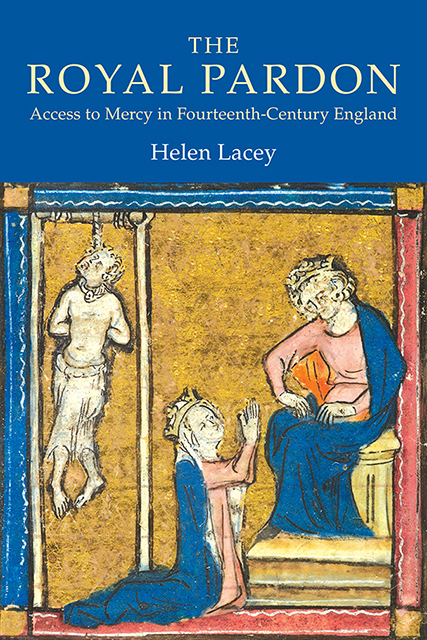Chapter One - Introduction
Published online by Cambridge University Press: 07 March 2023
Summary
The king's pardon was an important legal document in fourteenth-century England, yet its influence was felt far beyond the confines of the judicial system; it played a part in the major political crises of the period, and carried with it a symbolism that resonated throughout medieval culture. The power to grant mercy was inherited by the monarchs of later medieval England as one of the prerogative rights of the Crown. In practical terms this privilege was extended to supplicants in the form of letters patent of pardon, which were authorised by the monarch or his chancellor and then issued from the royal Chancery. The prerogative was wide-ranging: as ultimate arbiter of the law, the king could intervene at any point in the legal process and pardon all charges brought in his name. From the accession of Edward I to the deposition of Richard II, close to 40,000 of these letters patent are recorded on the patent rolls alone, and numbers were increasing across the period, despite the dramatic fall in population after the mid-century Black Death pandemic. While in many ways the monarchs of the fourteenth century had come to preside over the judicial system as symbolic figureheads, rather than active judges, they still saw fit, on occasion, to personally intervene and grant mercy to one of their subjects.
The fourteenth century also saw an important innovation in the process of pardoning; in the latter half of Edward III's reign the Crown introduced a new form of comprehensive pardon, enshrined in statutory form and available to anyone who chose to purchase a copy before a stated deadline. These ‘general pardons’ were negotiated in Parliament, and involved the active cooperation of the Commons in their formulation. Indeed, the use of pardons of all types became a regular feature of parliamentary discussion and debate. The grant of a general pardon, in particular, could play an important political role in symbolising reconciliation between the Crown and the polity in the aftermath of a governmental crisis on the scale of the Good Parliament in 1376, for example, or the 1381 Peasants’ Revolt. Moreover, they provided tangible evidence of the Crown's obligation to provide effective justice for its subjects. Accordingly, these public acts of mercy became trademarks of the English Crown in the later Middle Ages, yet their role has received little attention from historians.
- Type
- Chapter
- Information
- Publisher: Boydell & BrewerPrint publication year: 2009



